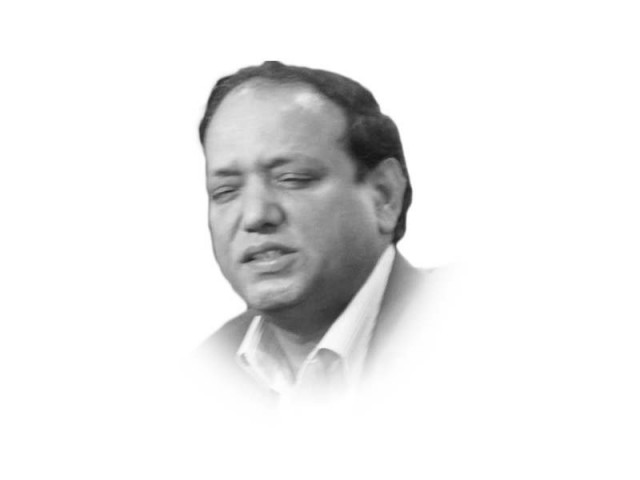Countering the secrecy narrative
Successive governments continue the colonial era patron-client relationship between the rulers and the people

The writer is author of Disabled by Society and The Wise Man and is associated with Centre for Peace and Development Initiatives. He tweets @XahidAbdullah
However, even after Independence, successive governments conveniently benefited from the colonial legal and administrative regime that encourages and protects the secretive functioning of public bodies and dispensation of official business behind closed doors. Instead of changing the colonial era patron-client relationship between the rulers and the people, by changing the secrecy narrative, the ruling elite has further strengthened it as it helps to project them as saviours when they toss crumbs at the masses while continuing to be the principal beneficiaries of the system. The key pillars of the secrecy narrative in the country, such as national security, a threat to the safety of public officials, the privacy of elected representatives and the damage done to the country’s foreign relations by public officials, need to be seen in line with public interest. Furthermore, a transparency narrative that gives primacy to public good without compromising the safety and privacy of the individuals and the security needs of the state, needs to be strengthened.
Information commissions established under the Khyber-Pakhtunkhwa Right to Information Act of 2013 and the Punjab Transparency and Right to Information Act of 2013, can play a pivotal role in building this transparency narrative. We are in for a long haul but it is encouraging to note that a new transparency narrative countering the secrecy narrative within the bounds of the law of the land has already started emerging.
Now, public officials cannot raise the spectre of personal safety to deny access to information as was the case when access to the certified copy of the logbook of the District Coordination Officer (DCO) was requested under the Punjab Transparency and Right to Information Act of 2013. It was maintained in the hearing before the Punjab Information Commission, that the DCO performs his duty in a sensitive area and that there will be a threat to his safety; as the logbook contains information about the past movements of the DCO, which could be used to anticipate his future movements.
In an order dated October 3, 2014, the commission said: “This argument merits consideration, as the Respondent undeniably performs certain sensitive functions and it has been argued that his past movements might be used to predict his future travels. But the point is whether, in this instance, the potential or perceived risk to life or safety of a person touches the threshold where it could be justifiably used as a ground to restrict transparency and a fundamental right to information under Article 19A of the Constitution. The Commission is of the view that the mere mention, assumption or apprehension of possible harm to life or safety of a person is not enough to claim an exception u/s 13(e) of the Act””.
In a request filed under the RTI laws of the land, public officials have been building a secrecy narrative around the supposed invasion of privacy. In the case of Mr Amer Ejaz vs Secretary, Punjab Assembly, the Punjab Information Commission in its order on January 12, 2015: “settled the issue of the attendance record of the members of the provincial assembly as personal information.” The commission said: “The requested information is about the attendance record of elected representatives who perform a public function within their constitutional mandate and are accountable to citizens. They are also compensated in the form of salary, allowances and other perks or privileges for the work they undertake and the functions they perform; whereas the attendance record provides a basis for documenting performance, processing compensation and administering legislative business all of these relate to the official or public, not their personal domain”.
While the Punjab Information Commission is trying to change the secrecy narrative by building a transparency narrative, the PML-N government has reinforced the age old-adage that the more things change, the more they remain the same.
On January 16, 2016, it was reported in the national media that the federal government has formed a special committee to review the draft Right to Information Bill approved by the Senate Committee on Information and Broadcasting on July 15, 2014 in the light of the ‘changing security situation’. The formation of this special committee is especially baffling given the fact that there are already adequate and strong safeguards in the bill to protect sensitive information. For example, Section 2 (vii) defines ‘national security’ and sections 18, 19 and 22 have been specifically inserted to protect the disclosure of sensitive information pertaining to international relations, the enforcement of law and national security, respectively. Furthermore, another safeguard against the disclosure of sensitive information is the proposed Pakistan Information Commission to be established under Section 29 and comprising three information commissioners drawn from the superior judiciary, lawyers’ fraternity and civil society. This commission will decide whether the disclosure of certain information will be harmful to national security or the disclosure will serve public interest. Lastly, even if the federal government is not satisfied with the decision of the Pakistan Information Commission, it would be able to file a writ petition with the superior judiciary to adjudicate on the findings of the commission.
It is extremely unfortunate that a democratically-elected government has chosen to strengthen the secrecy narrative at the expense of the transparency narrative, by raising the bogey of the ‘changing security situation’. In this context, we must keep in mind what Benjamin Franklin said: “Those who surrender freedom for security will not have, nor do they deserve, either one.”
Published in The Express Tribune, February 27th, 2016.
Like Opinion & Editorial on Facebook, follow @ETOpEd on Twitter to receive all updates on all our daily pieces.















COMMENTS
Comments are moderated and generally will be posted if they are on-topic and not abusive.
For more information, please see our Comments FAQ